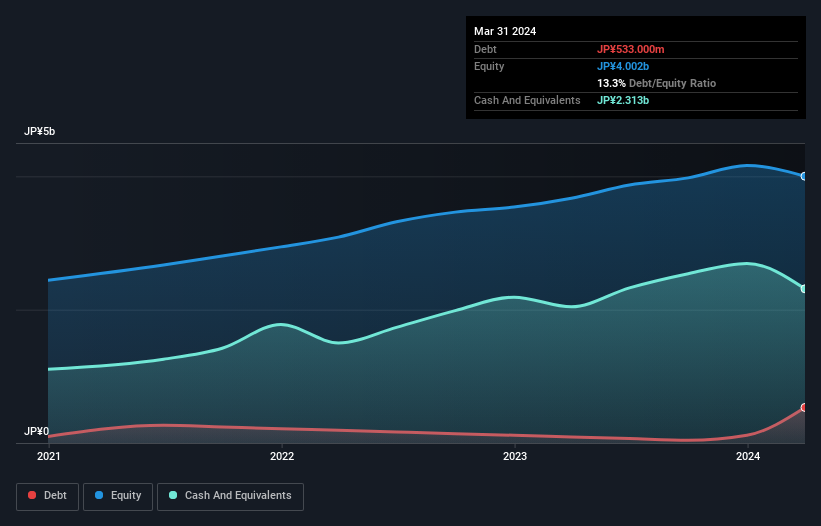
The external fund manager backed by Berkshire Hathaway's Charlie Munger, Li Lu, makes no bones about it when he says 'The biggest investment risk is not the volatility of prices, but whether you will suffer a permanent loss of capital.' So it seems the smart money knows that debt - which is usually involved in bankruptcies - is a very important factor, when you assess how risky a company is. We note that BRIDGE International Corp. (TSE:7039) does have debt on its balance sheet. But is this debt a concern to shareholders?
When Is Debt Dangerous?
Debt is a tool to help businesses grow, but if a business is incapable of paying off its lenders, then it exists at their mercy. If things get really bad, the lenders can take control of the business. However, a more usual (but still expensive) situation is where a company must dilute shareholders at a cheap share price simply to get debt under control. Having said that, the most common situation is where a company manages its debt reasonably well - and to its own advantage. When we think about a company's use of debt, we first look at cash and debt together.
See our latest analysis for BRIDGE International
What Is BRIDGE International's Net Debt?
The image below, which you can click on for greater detail, shows that at March 2024 BRIDGE International had debt of JP¥533.0m, up from JP¥91.0m in one year. But on the other hand it also has JP¥2.31b in cash, leading to a JP¥1.78b net cash position.

How Healthy Is BRIDGE International's Balance Sheet?
We can see from the most recent balance sheet that BRIDGE International had liabilities of JP¥1.09b falling due within a year, and liabilities of JP¥376.0m due beyond that. Offsetting these obligations, it had cash of JP¥2.31b as well as receivables valued at JP¥1.25b due within 12 months. So it actually has JP¥2.10b more liquid assets than total liabilities.
This luscious liquidity implies that BRIDGE International's balance sheet is sturdy like a giant sequoia tree. With this in mind one could posit that its balance sheet means the company is able to handle some adversity. Simply put, the fact that BRIDGE International has more cash than debt is arguably a good indication that it can manage its debt safely.
Fortunately, BRIDGE International grew its EBIT by 4.8% in the last year, making that debt load look even more manageable. The balance sheet is clearly the area to focus on when you are analysing debt. But it is BRIDGE International's earnings that will influence how the balance sheet holds up in the future. So if you're keen to discover more about its earnings, it might be worth checking out this graph of its long term earnings trend.
But our final consideration is also important, because a company cannot pay debt with paper profits; it needs cold hard cash. BRIDGE International may have net cash on the balance sheet, but it is still interesting to look at how well the business converts its earnings before interest and tax (EBIT) to free cash flow, because that will influence both its need for, and its capacity to manage debt. During the last three years, BRIDGE International produced sturdy free cash flow equating to 74% of its EBIT, about what we'd expect. This cold hard cash means it can reduce its debt when it wants to.
Summing Up
While it is always sensible to investigate a company's debt, in this case BRIDGE International has JP¥1.78b in net cash and a decent-looking balance sheet. And it impressed us with free cash flow of JP¥595m, being 74% of its EBIT. So we don't think BRIDGE International's use of debt is risky. When analysing debt levels, the balance sheet is the obvious place to start. But ultimately, every company can contain risks that exist outside of the balance sheet. Be aware that BRIDGE International is showing 3 warning signs in our investment analysis , you should know about...
If you're interested in investing in businesses that can grow profits without the burden of debt, then check out this free list of growing businesses that have net cash on the balance sheet.
Valuation is complex, but we're here to simplify it.
Discover if BRIDGE International might be undervalued or overvalued with our detailed analysis, featuring fair value estimates, potential risks, dividends, insider trades, and its financial condition.
Access Free AnalysisHave feedback on this article? Concerned about the content? Get in touch with us directly. Alternatively, email editorial-team (at) simplywallst.com.
This article by Simply Wall St is general in nature. We provide commentary based on historical data and analyst forecasts only using an unbiased methodology and our articles are not intended to be financial advice. It does not constitute a recommendation to buy or sell any stock, and does not take account of your objectives, or your financial situation. We aim to bring you long-term focused analysis driven by fundamental data. Note that our analysis may not factor in the latest price-sensitive company announcements or qualitative material. Simply Wall St has no position in any stocks mentioned.
Have feedback on this article? Concerned about the content? Get in touch with us directly. Alternatively, email editorial-team@simplywallst.com
About TSE:7039
BRIDGE International
Provides services focusing on corporate sales in Japan.
Excellent balance sheet, good value and pays a dividend.


